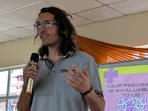The Chilling True Story Behind Dr. Death: Cutthroat Conman
The idea of a tracheal transplant with minimal risk of rejection because the incoming part was made with a patient's own cells? Who wouldn't want that to be possible?
Dr. Paolo Macchiarini told the world it was, time and again—and not only was it possible, he was doing it, using synthetic windpipes made out of porous plastic that he seeded with stem cells harvested from his patients' bone marrow. According to the numerous articles he published in medical journals, these operations were clinical successes.
Except that at least seven people he implanted with one of these newfangled tracheae ended up dying.
By 2016, investigations were underway in multiple countries as to how Macchiarini had been able to literally operate so freely without abiding by standard ethics protocol and without testing the efficacy of the science before his patients went under the knife.
So in the long run, the extramarital affair, criminal charges and bizarre list of lies the doctor allegedly told were almost afterthoughts by comparison. Almost.
Macchiarini's shocking downfall is the subject of Doctor Death: Cutthroat Conman, the second installment of the Peacock anthology series that previously took on the case of neurosurgeon Christopher Duntsch, who's serving a life sentence for the damage he left behind in his wake.
Edgar Ramirez plays Macchiarini, while Mandy Moore co-stars as Benita Alexander, the investigative journalist the doctor seduced under extremely false pretenses while she was working on a 2013 story about regenerative medicine.
"It's imperative that you believe the love story," Moore told E! News ahead of the show's Dec. 21 premiere, "that you believe a really capable, accomplished woman of Benita's stature would be susceptible to this kind of deception. And Paolo is a mastermind...Slowly but surely, through the charm offensive and manipulation, he was able to get what he wanted from [his patients and colleagues]—and I think he employed that similarly in his personal side with Benita."
Noting the "ambiguity written within the story," Ramirez described his character as a man who's "keeping a fantasy alive for as long as he can."
The Venezuelan actor added, "There is no moment of admission, he never admitted what he did. It is like a train that departed from a station until the very end it collapsed, or crashed into his own destiny."
Who is Paolo Macchiarini?
Born in Switzerland to Italian parents, Macchiarini got his medical degree from the University of Pisa in 1986. According to a C.V. he submitted when he went to work in Sweden years later, he earned a master's and a doctorate in organ and tissue transplantation from the University of Franche-Cômpte in Beçanson, France, in the 1990s.
He also married Emanuela Pecchia in 1986, according to Vanity Fair, and they had a daughter and a son together.
As his transplant innovations made headlines, Macchiarini became an international star in medical circles, the Italian press dubbing him "superchirurgo," or "super-surgeon."
Talking to The Lancet in 2012 about working in multiple countries, including France, Italy, Germany, England, Sweden and Russia, Macchiarini said, "I think if you stay in a single place for your entire life you restrict your capacity...In 10 years it came to a point where I was adult, and I needed to go away to express my creativity."
What did Paolo Macchiarini do in Sweden?
Macchiarini was working at the Karolinska Institute in Stockholm, where the recipients of the Nobel Prize for medicine are decided, when he implanted the first synthetic trachea in Andemariam Beyene in June 2011.
"I was almost dead," recalled Beyene, an Eritrean-born graduate student who had a massive tumor in his windpipe when he traveled from his home in Iceland to Sweden seeking treatment in the spring of 2011. "There was suffering," the 39-year-old told the New York Times 15 months after his transplant. "A lot of suffering."
Still, Beyene was admittedly skeptical when he first heard Macchiarini's pitch.
"I told him, I prefer to live three years and then die," he said. "I almost refused. It had only been done in pigs. But he convinced me in a very scientific way." The father of two added, "Things are good. Life is much better."
Explaining how the stem cell regeneration seemingly worked, Macchiarini noted, "We are far away from understanding this process. Far, far away."
Christopher Lyles, 30, of Maryland was next to receive a bioartificial windpipe at Karolinska in November 2011. Back home in the U.S., he died in March 2012 of undisclosed causes. (There was reportedly no autopsy.)
Macchiarini told the Times in September 2012—when Beyene's transplant was being cautiously heralded as a potential game-changer—that Lyles' implant had been functioning properly when he was discharged from the hospital eight weeks after surgery. And, the doctor said, he had since done the procedure on two more patients in Russia and both were doing well.
Beyene died on Jan. 30, 2014, after suffering repeated lung infections, per subsequent accounts of his case. An autopsy showed a clot in his lung, and his synthetic trachea had come loose.
The two Russian patients also died in 2014, according to BBC News. His final recorded transplant patient, a Russian man, got the synthetic trachea in June 2014 and was still alive two years later, per the BBC, but his synthetic implant had been removed and replaced with a donor trachea.
How did Benita Alexander get involved with Paolo Macchiarini?
Alexander, an Emmy-winning producer, met Macchiarini in 2013 while working on the NBC News special A Leap of Faith. Host Meredith Vieira had read about the surgeon in the NY Times and was intrigued by the idea of regenerative medicine.
When Alexander had her first sit-down with Macchiarini, she was going through a lot, she recalled to Vanity Fair in 2015. Her ex-husband, with whom she shared a 10-year-old daughter, had brain cancer and her second marriage wasn't going well.
"Having worked with so many patients who are terminally ill, Paolo was immensely helpful as far as helping me navigate my complicated emotions," Alexander told VF. "He was an amazing friend to me during that time, and a solid, reliable pillar of strength. He spent hours listening to me talk about it all and offering gentle advice."
While working on Leap of Faith in the spring of 2013, Alexander ended up spending a lot of time—including dinners for two—with Macchiarini in Peoria, Ill., where he was preparing to operate on 2-year-old Hannah Warren, who was born without a windpipe and had been hospitalized for most of her life in her native Seoul.
The child died of post-surgical complications less than three months after the surgery, according to VF.
In June 2013, while they were still shooting the special, Alexander went to Venice, Italy, with Macchiarini for what she described to the magazine as "an incredibly romantic weekend."
He was love-bombing her with fancy dinners, expensive gifts, "the works," she said. "When it came to money, he was incredibly generous."
And of course she knew she was violating a sacred rule of her profession. "As a journalist, you're supposed to be objective," Alexander said in the Netflix docuseries Bad Surgeon: Love Under the Knife, which just premiered last month. You may spend a lot of time with a subject "in intimate situations and you certainly can't get involved personally with somebody in a relationship—because then your objectivity could go flying out the window."
But at the time, she explained, she simply had no inkling that Macchiarini could have had ulterior motives, and she was falling madly in love with him.
Two weeks after Venice, she flew to see him in Stockholm. By the time they went to London in October 2013, "the story was basically done," Alexander told VF. "It was all little tweaking after that, nothing significant, and so I totally separated Paolo and work in my head. I was in love and because I had made a very personal decision to take a leap of faith for love, I never looked back."
Macchiarini proposed on Christmas Day in 2013, according to Alexander. They traveled all over, she met his mother in Italy and, Alexander noted, her fiancé told her in the summer of 2014 that his divorce had been finalized. Leap of Faith aired that June and was nominated for an Emmy, Outstanding Feature Story in a News Magazine.
They set a wedding date for July 11, 2015. Invitations were printed and preparations for the bride's elaborate custom gown got underway. Macchiarini told Alexander and others, per VF, that Pope Francis was among his VIP patients and was going to not only host their nuptials at his summer residence, the Apostolic Palace of Castel Gandolfo, but also officiate, and Andrea Bocelli would sing.
Alexander left NBC on May 13, 2015, with plans to move to Barcelona. The very next day, Alexander said, a friend emailed her with news about the pope visiting South America when he was supposed to be hosting her wedding.
A few weeks later, she notified her guests the wedding was off, the extent of Macchiarini's deception slowly dawning on her.
"I just didn't want to put two and two together," she reflected to VF. "I didn't want Paolo to not be the man I believed him to be. I didn't want the fairy tale to end." (She hired a private investigator, who promptly found out Macchiarini was still married. And neither the pope nor Bocelli had ever heard of him.)
Asked why she never doubted what in hindsight were some truly outrageous claims, Alexander said, "This was not some guy I picked up in a bar. This was a renowned, accomplished, established surgeon whom we had followed all over the world."
What led to Paolo Macchiarini's downfall?
In November 2014, the Karolinska Institute in Sweden ordered an independent investigation into its star doctor's methods after four physicians who helped care for Macchiarini's three transplant patients, including Beyene and Lyles, filed detailed complaint letters that summer.
Per the New York Times, Macchiarini was accused of not bothering to seek ethical approvals for his surgeries and of misleading medical journals about their outcomes. (Ultimately, 11 of the papers he published over the years were retracted.)
"We have never ever manipulated data," Macchiarini told the Times. He also maintained that he abided by all medical ethics laws and regulations.
The third transplant patient referred to in the complaints, Yesim Cetir, was still alive when the investigation began.
Her own trachea was damaged during an unrelated surgery in her native Turkey. She was 22 when, in July 2012, she had her right lung removed and, two weeks later, was implanted with a synthetic trachea at Karolinska University Hospital. When that pipe started to collapse, Macchiarini replaced it with another in July 2013. She'd been hospitalized ever since, doctors said in the complaint, and her airway needed to be manually cleared roughly every four hours.
According to a later accounting of Macchiarini's Karolinska transplant history, Cetir underwent a multiple-organ transplant in Philadelphia in 2016. She received yet another trachea, this time from a human donor, but Cetir died in March 2017.
What happened to Paolo Macchiarini after accusations went public?
Alexander, who at the time was still planning to marry him, later remembered how stressed Macchiarini was in the weeks leading up to the 2014 New York Times report about the Karolinska investigation. "He had been talking to me for some time about how there were people that were against him, and his 'enemies,'" she told 20/20 in 2021.
He denied all of the accusations against him, Alexander said, and she stayed in his corner until the whole pope debacle.
But after they broke up in 2015, things unraveled quickly.
"It turned out that Macchiarini had always liked journalists and had often invited TV teams to his surgeries," documentarian Bosse Lindquist, who followed the doctor around for months while shooting a series for Swedish public television, told BBC News in 2016.
Macchiarini admitted to Lindquist that he had never tested the viability of the plastic tracheae before implanting them in humans (animal testing remains a standard step in medical research). The surgeon maintained that his cases were too urgent, that there wasn't time to go through all the red tape.
Lindquist's docuseries, eerily titled The Experiments, premiered on Sweden's SVT in January 2016. Within months, per the BBC, Macchiarini's contract with the Karolinska Institute was terminated, the vice-chancellor of the organization and the dean of research resigned, and any remaining KI board members were ousted.
In March 2016, Macchiarini indicated he wouldn't take his firing lying down, telling Nature, "I have instructed lawyers and will be taking immediate steps to restore my reputation."
"It is very strange that it should take a TV program to make this public," Bo Risberg, professor emeritus of surgery at the University of Gothenberg and a former chairman of the Swedish Ethics Council, said in response to The Experiments. "Everything was swept under the carpet." Failing to do pre-clinic work with animals, Risberg added, was "the worst crime you can commit."
Meanwhile, the independent investigation requested by KI determined that the science behind the synthetic trachea implantation was weak and Macchiarini had gone ahead with non-emergency surgeries without proper risk analyses or ethical approvals, according to a report released in September 2016.
And if he had gone through proper channels, the report stated, "it is unlikely that the project would have been approved."
A separate inquiry found that the institute didn't do its due diligence when recruiting Macchiarini in 2010 and then, when the independent investigator first issued his report in May 2015 concluding the surgeon's conduct amounted to experimenting on human patients, the institute let it go, according to the BBC and ABC News.
What has Paolo Macchiarini said about accusations of medical and ethical misconduct?
"We had a human being that we wanted to save," Macchiarini said on SVT in May 2016 about the decision to operate on Beyene. "And in these circumstances what would you do? Do you just leave him dying at that young age? I don't think it's correct."
Plus, he added, "There were 30 or more professionals involved in the decision-making process and then even in the inter-operative and postoperative care of the patient."
In response to the KI report released a few months later, Macchiarini said he thought it was the job of hospital administrators to secure any necessary ethics approvals.
"I would welcome international discussion and clarification of the ethical processes to be undertaken in such difficult circumstances as these—where experimental treatments are involved," the doctor wrote in an email to the BBC. "It is clearly a difficult area for clinicians and researchers to be involved in, and yet vitally important that new treatments are developed and tried…"
Beyene was the recipient of an untested treatment, Macchiarini acknowledged, but "I would like to add that the welfare of patients has always been my driving concern."
As for those who were questioning the entire procedure he'd devised, Macchiarini reiterated to the BBC, "There is no doubt that it is a viable technology."
Did Paolo Macchiarini go to prison?
Swedish authorities investigated Macchiarini for possible involuntary manslaughter in 2016 but no charges were ever filed and the case was closed the following year.
In 2019, he was sentenced in Italy to 16 months in prison for forging documents and abuse of office, but was acquitted by the country's Supreme Court.
In December 2018, Swedish prosecutors reopened their investigation. On June 16, 2022, Macchiarini was convicted of one count of causing bodily harm and found not guilty of two counts of assault. A judge gave him a suspended sentence.
"In all cases, the interventions were contrary to science and best practice," chief prosecutor Mikael Björk, who had asked for five years in prison, said in appealing the more lenient sentence. "It seems clear to me that these have been completely unlawful human experiments and the penalty should be a long prison sentence, given the nature of the crime and the high penal value."
In June 2023, a Swedish appeals court found Macchiarini guilty of gross assault and sentenced him to 30 months in prison, according to Reuters.
Macchiarini denied any criminal wrongdoing. Sweden's Supreme Court refused to hear his appeal, however, explaining in an Oct. 30 statement that they'd seen no evidence the verdict was wrong and no significant legal issues with the case that merited their review.
As of Dec. 18, Macchiarini, now 65, was expected to start serving his sentence within weeks—most likely in Spain, where he lives, as opposed to in Sweden, according to Science.
Where is Benita Alexander now?
Alexander made it her mission to make sure there were no illusions about who Macchiarini really was. After finding out how many lies he'd told her, she started sharing her story—and didn't see any reason to stop.
"As furious as it makes me, what he did [to me and] my daughter, the thought that this is a man who has people's lives in his hands. This is a surgeon," Alexander said on 20/20 in 2021. "People could be dying because of this man, and therefore, I couldn't stay silent, I couldn't crawl under the covers...I had to expose him."
She further reflected this year in Netflix's Bad Surgeon, "His nickname was 'the super surgeon' and he was adored and adulated. Everybody was fooled by this man. I was engaged to a monster."
Dr. Death: Cutthroat Conman is streaming now on Peacock.
(E!, Peacock and NBC News are all members of the NBCUniversal family.)
Disclaimer: The copyright of this article belongs to the original author. Reposting this article is solely for the purpose of information dissemination and does not constitute any investment advice. If there is any infringement, please contact us immediately. We will make corrections or deletions as necessary. Thank you.
Title:The Chilling True Story Behind Dr. Death: Cutthroat Conman
Url:https://www.investsfocus.com









